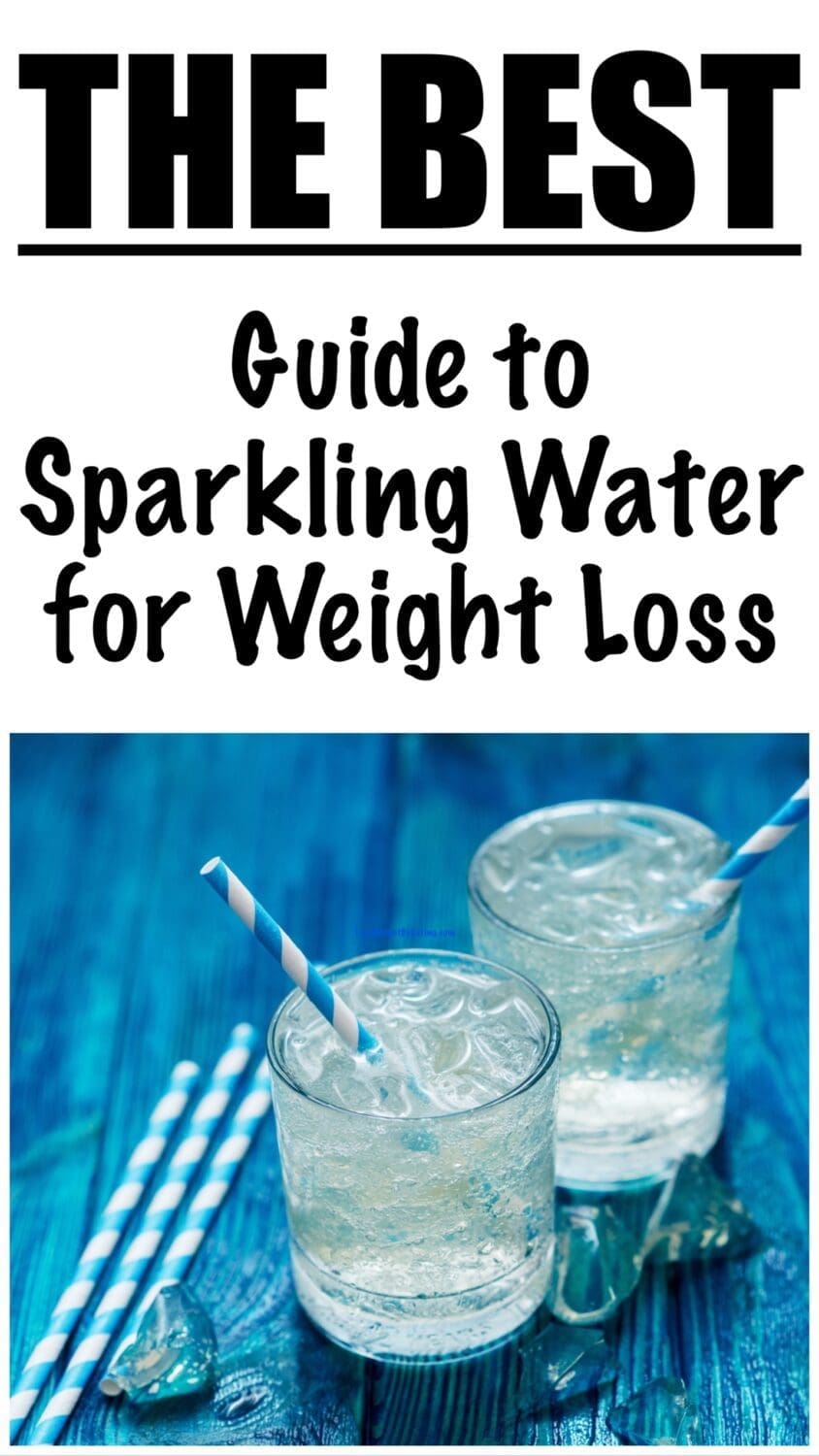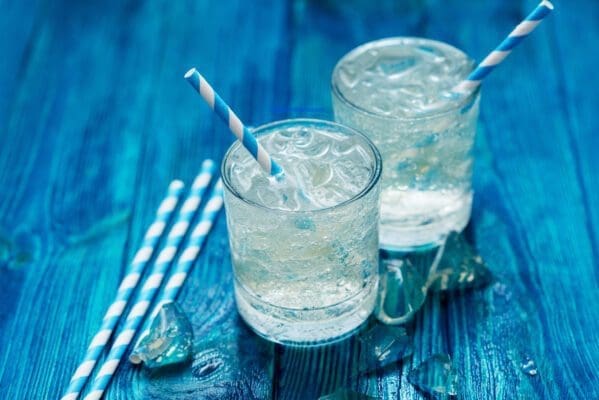In this guide I’l review sparkling water benefits and warnings and answer the question: Is Sparkling Water Good for Weight Loss?
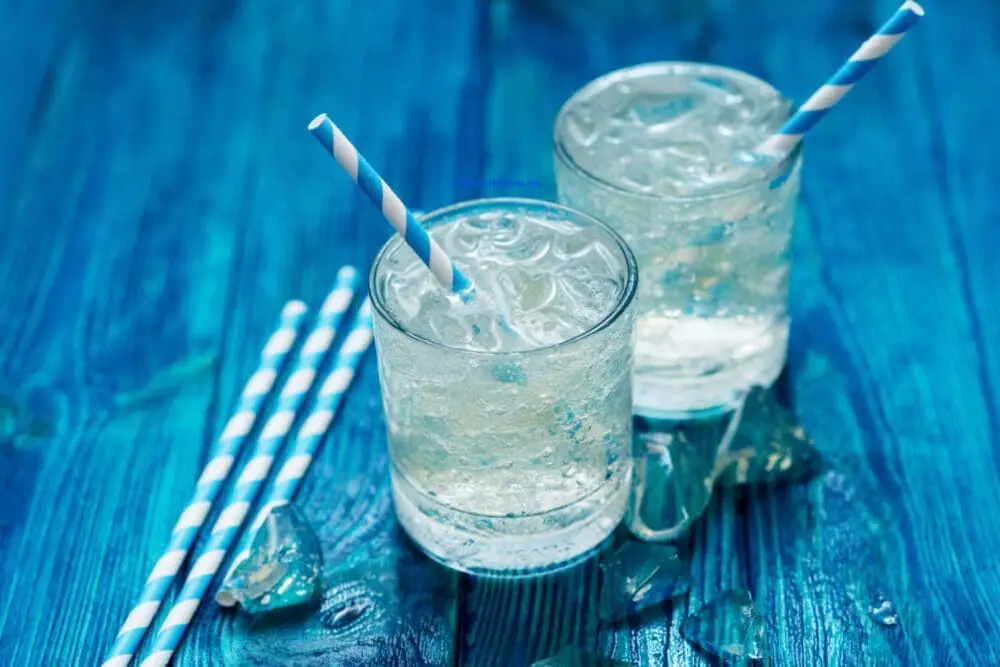

In the pursuit of shedding those extra pounds, people often turn to various beverages, hoping to find a magical elixir that can aid in their weight loss journey.
One such beverage that has gained popularity in recent years is sparkling water. With its fizzy bubbles and refreshing taste, sparkling water seems like a tempting option for those looking to cut down on calories.
But does it really help with weight loss? In this article, I’ll delve into the world of sparkling water and explore its potential effects on weight loss.
What is Sparkling Water?
Sparkling water, also known as carbonated water or soda water, is water that has been infused with carbon dioxide gas under pressure. This process creates the characteristic fizzy bubbles that make sparkling water distinct from still water.
The carbonation of water can occur naturally, such as in natural mineral springs that naturally contain carbon dioxide. However, most commercially available sparkling water is created by artificially injecting carbon dioxide into purified water.
Sparkling water can be enjoyed in its plain form, without any added flavors or sweeteners. It provides a bubbly and refreshing sensation, similar to carbonated beverages, but without the added sugars or artificial ingredients.
How is Sparkling Water Made?
There are different methods for producing sparkling water, including:
- Carbonation with Carbon Dioxide: This is the most common method used in commercial production. Carbon dioxide is dissolved under pressure into purified water, creating the carbonation and bubbles.
- Natural Carbonation: Some sparkling waters occur naturally when water sources have high levels of dissolved carbon dioxide. These natural springs or wells provide naturally carbonated water without the need for additional carbonation.
- Home Carbonation Devices: Many people use home carbonation devices, such as soda makers, to carbonate their own water at home. These devices allow you to control the level of carbonation and customize the flavors by adding fruits or natural extracts.
Sparkling Water Varieties
Sparkling water comes in various forms, each offering a unique taste and experience. Here are some common varieties:
- Plain Sparkling Water: This is the most basic form of sparkling water, containing carbonation without any added flavors or sweeteners. It provides a clean and crisp taste, similar to still water but with the added fizziness.
- Flavored Sparkling Water: Some sparkling water brands offer flavored options, where natural fruit essences or extracts are added to the carbonated water. These flavors can range from citrus fruits like lemon and lime to more exotic options like berry or cucumber.
- Sparkling Mineral Water: Mineral water naturally contains minerals and trace elements that can contribute to its taste and potential health benefits. When carbonated, it becomes sparkling mineral water, offering both the fizzy bubbles and the minerals.
- Sparkling Water with Sweeteners: Some varieties of sparkling water may contain artificial or natural sweeteners to enhance the flavor. These can include options with zero-calorie sweeteners like stevia or sucralose, as well as those with natural sweeteners like cane sugar or fruit juices.
How to Enjoy Sparkling Water
Sparkling water can be enjoyed in various ways:
- On Its Own: Plain sparkling water can be enjoyed as a refreshing beverage on its own. The carbonation provides a unique sensation and can be a satisfying alternative to still water.
- Mixers for Drinks: Sparkling water can be used as a mixer in cocktails or mocktails. Its bubbly nature can add a fun twist to your favorite beverages without the added calories or sugars found in traditional sodas.
- Flavor Enhancers: You can customize the flavor of sparkling water by adding natural flavor enhancers like citrus slices (lemon, lime, or orange), berries, or herbs (mint, basil, or rosemary). This allows you to experiment with different combinations and create your own signature sparkling water flavors.
- Hydration Support: Sparkling water can be a great option for staying hydrated throughout the day. It provides a refreshing alternative to plain water, making it easier and more enjoyable to meet your daily hydration needs.
Whether you prefer the simplicity of plain sparkling water or the burst of flavor from the flavored varieties, there is a sparkling water option to suit every taste preference.
Is Sparkling Water Good for Weight Loss?
Sparkling water, often referred to as carbonated water or soda water, is plain water that has been infused with carbon dioxide gas. It is known for its bubbly texture, which can make it a satisfying alternative to sugary sodas and other calorie-laden beverages. But when it comes to weight loss, does sparkling water really live up to its hype?
The answer is both yes and no. While sparkling water itself doesn’t possess any magical weight loss properties, it can be a beneficial addition to a weight loss regimen. Here are a few reasons why:
1. Hydration without the Calories
Staying hydrated is crucial for overall health and can also support weight loss efforts. Sparkling water can be a great choice for hydration as it contains no calories, sugar, or artificial sweeteners.
By opting for sparkling water over sugary drinks or juices, you can quench your thirst without consuming excessive calories.
2. Reduced Cravings
One of the challenges faced during weight loss is dealing with cravings for high-calorie foods and beverages.
Sparkling water can come to the rescue by providing a refreshing and flavorful alternative to sugary drinks.
The fizzy bubbles can create a sensation of fullness, helping to curb cravings and reduce the temptation to indulge in calorie-rich treats.
3. Increased Satiety
Feeling satisfied and full after a meal is essential to prevent overeating and control calorie intake.
Some studies suggest that the carbonation in sparkling water may enhance feelings of satiety, leading to reduced hunger and potential calorie savings.
4. Replacement for Sugary Sodas
If you are used to consuming sugary sodas on a regular basis, switching to sparkling water can be a step in the right direction for weight loss.
By replacing calorie-laden sodas with sparkling water, you can significantly reduce your overall calorie intake, which is essential for shedding those extra pounds.
5. Versatility and Variety
One of the advantages of sparkling water is its versatility. It can be enjoyed plain or with a squeeze of citrus fruits like lemon, lime, or orange, adding a burst of flavor without the added calories.
By experimenting with different flavors and combinations, you can make your weight loss journey more exciting and enjoyable.
While sparkling water can have its benefits, it’s important to note that it is not a magical solution for weight loss. It should be viewed as a complementary beverage that can support your overall efforts rather than a standalone solution.
Bottom Line: Is Sparkling Water Healthy?
Sparkling water is a popular beverage choice for those seeking a refreshing and bubbly alternative to sugary sodas and other calorie-laden drinks. But is sparkling water truly a healthy option? Let’s summarize the key points to help you make an informed decision.
1. Hydration: Sparkling water can contribute to your daily hydration needs. Staying properly hydrated is essential for overall health and bodily functions.
2. Calorie-Free: Sparkling water is typically calorie-free and does not contain added sugars or artificial sweeteners. It can be a suitable choice for those looking to reduce their calorie intake.
3. Dental Considerations: The slight acidity in sparkling water can potentially erode tooth enamel over time. However, the acidity level is significantly lower than that of sugary sodas or citrus juices. Practicing good oral hygiene and drinking sparkling water in moderation can help minimize any negative effects.
4. Digestive Sensitivity: Some individuals may experience bloating or gas due to the carbonation in sparkling water. If you find that sparkling water causes discomfort, switching to still water may be a better option.
5. Nutrient Absorption: Carbonation itself does not significantly impact nutrient absorption. As long as you maintain a balanced diet, sparkling water is unlikely to hinder nutrient absorption.
6. Variety and Flavor: Sparkling water offers a wide range of flavors and options, allowing you to enjoy a fizzy beverage without the added sugars or artificial ingredients found in traditional sodas.
In conclusion, sparkling water can be a healthy choice when consumed in moderation. It can support hydration, be a calorie-free alternative to sugary drinks, and provide a refreshing taste experience.
However, it’s important to consider individual factors such as dental health and digestive sensitivity when incorporating sparkling water into your routine.
As with any beverage, it’s always best to listen to your body, make choices that align with your health goals, and maintain a balanced diet overall.
Is Carbonated Water Bad for You?
There has been some debate about whether carbonated water is bad for your health. Let’s take a closer look at the potential effects of carbonated water on the body.
1. Dental Health
One concern often raised is the impact of carbonated water on dental health. Carbonated water is slightly acidic, which can potentially erode tooth enamel over time.
However, the level of acidity in carbonated water is significantly lower than that of sugary sodas or citrus juices.
Additionally, drinking carbonated water in moderation and maintaining good oral hygiene practices, such as regular brushing and flossing, can help minimize any negative effects on dental health.
2. Digestive Health
Another area of concern is the effect of carbonated water on digestion. Some individuals may experience bloating or gas due to the carbonation.
However, this varies from person to person, and many people can tolerate carbonated water without any digestive issues.
If you find that carbonated water causes discomfort, it’s best to switch to still water to avoid any digestive disturbances.
3. Bone Health
There have been claims that carbonated water can potentially leach calcium from the bones, leading to weakened bone health.
However, current research suggests that the impact of carbonated water on bone health is minimal. In fact, some studies have found that carbonated water with added minerals can have a positive effect on bone density.
As long as you have a balanced diet rich in calcium and engage in weight-bearing exercises, carbonated water is unlikely to have a significant negative impact on bone health.
4. Dehydration
One concern that arises when discussing carbonated water is whether it can contribute to dehydration. The carbonation in sparkling water does not inherently dehydrate the body.
In fact, sparkling water can contribute to overall hydration. However, it’s important to note that excessive consumption of carbonated beverages, including carbonated water, may lead to a feeling of fullness, which could potentially reduce the amount of plain water consumed.
It’s crucial to maintain a healthy balance and ensure an adequate intake of plain water for optimal hydration.
5. Nutrient Absorption
Some people worry that carbonated water may hinder the absorption of nutrients. However, there is limited evidence to support this claim.
Carbonation itself does not interfere with nutrient absorption in a significant way. As long as you have a varied and balanced diet, carbonated water is unlikely to negatively impact nutrient absorption.
In conclusion, carbonated water is generally considered safe for consumption and does not pose significant health risks. It may cause minor dental erosion or digestive discomfort in some individuals, but these effects can be minimized by drinking in moderation and maintaining good oral hygiene practices.
As with any beverage, it’s important to consider your own body’s response and make choices that align with your individual preferences and health goals.
Frequently Asked Questions (FAQ)
No, sparkling water itself does not have any negative effects on weight loss. However, certain flavored sparkling waters may contain added sugars or artificial sweeteners, which can contribute to calorie intake and hinder weight loss efforts. It’s important to read the labels and opt for unsweetened sparkling water varieties.
While sparkling water can contribute to hydration, it’s still essential to drink an adequate amount of plain water throughout the day. Regular water is important for various bodily functions and helps maintain overall health. Sparkling water can provide some hydration, but it should not be the sole source of hydration for weight loss.
Sparkling water itself does not have any significant impact on calorie burning. Weight loss occurs when there is a calorie deficit, meaning you consume fewer calories than you burn. While sparkling water can be a low-calorie beverage option, it does not directly contribute to calorie burning.
Some people find that the carbonation in sparkling water can lead to feelings of bloating or gas. However, this can vary from person to person. If you experience bloating after consuming sparkling water, it may be best to opt for still water to alleviate any discomfort.
The choice between still water and sparkling water ultimately comes down to personal preference. Both can contribute to hydration, and the decision depends on individual taste and satisfaction. If you enjoy the fizziness and flavor of sparkling water, it can be a suitable option as part of a weight loss plan.
There are no specific guidelines for the amount of sparkling water to consume for weight loss. It’s important to listen to your body’s hydration needs and consume an adequate amount of water throughout the day. Remember that sparkling water should be a complement to a balanced diet and exercise regimen.
Final Thoughts
While sparkling water may not directly cause weight loss, it can be a valuable addition to a weight loss journey. Its calorie-free nature, refreshing taste, and ability to reduce cravings make it a favorable choice for those looking to cut down on sugary beverages. However, it’s important to choose unsweetened varieties and incorporate sparkling water into an overall healthy lifestyle.
Remember that weight loss is a holistic process that involves creating a calorie deficit through a combination of healthy eating and regular physical activity. Sparkling water can be a helpful tool in this process, but it should not be relied upon as a standalone solution.
So, the next time you’re reaching for a beverage, consider swapping that sugary soda for a fizzy and refreshing glass of sparkling water. While it may not possess any magical weight loss properties, it can certainly be a healthier choice that aligns with your weight loss goals.
What to Read Next:
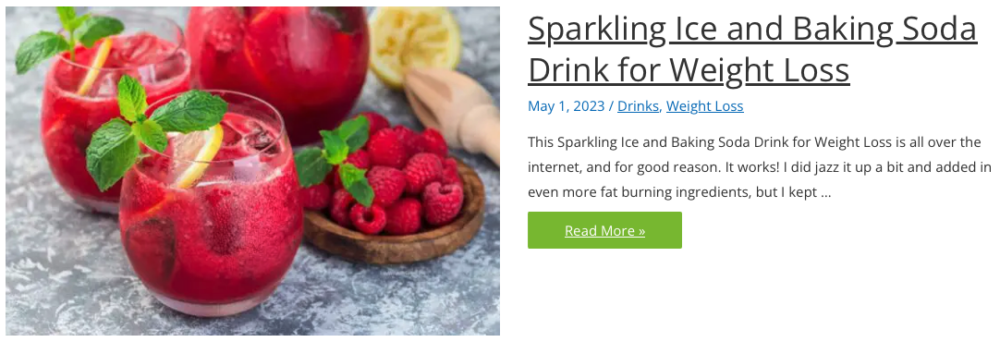



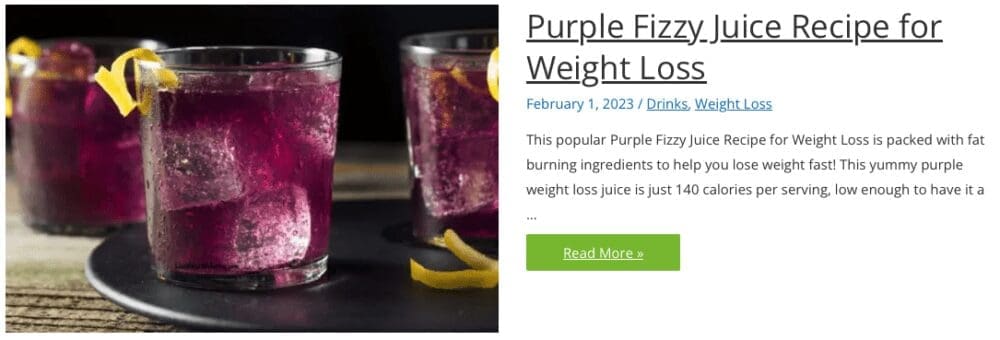

Lose Weight By Eating Cookbooks


Share this Weight Loss Article:
